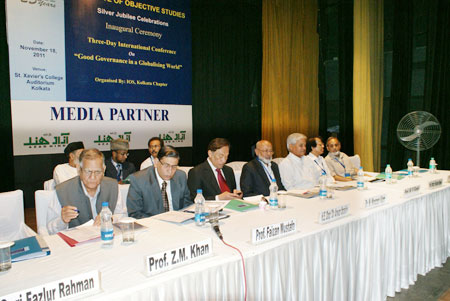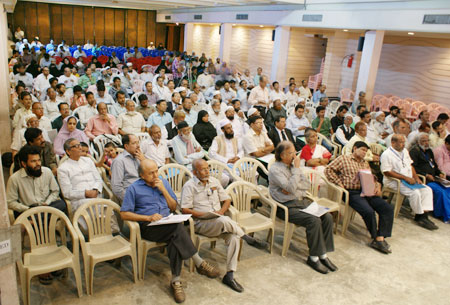
L-R: Prof. ZM Khan, Secretary General, IOS; Prof. (Dr.) Faizan Mustafa, Vice Chancellor, National Law University, Bhubaneswar; H. E. Dato Dr Anwar Ibrahim, Former Deputy Prime Minister of Malaysia; Dr Mohammad Manzoor Alam, Chairman IOS; Prof. MP Singh, Vice Chancellor National University of Juridical Sciences, Salt Lake, Kolkata; Prof. (Dr.) Imtiaz Ghulam Ahmed, Faculty of Law, Calcutta University; Dr. Abdur Rahim Khan, Ex Principal Bangabashi College, Kolkata
Malaysia’s former deputy PM Anwar Ibrahim raises issues of justice, fair play, pluralism, rule of law and good governance as other eminent intellectuals analyse and grapple with core issues.
Kolkata, Nov. 18: A thrice-day international conference on “Good Governance in a Globalising World” began here today at the St. Xavier’s College with the recital of verses from the holy Quran by Abdul Basit Ismail, who later conducted the proceedings.
Prof. Imtiaz Ghulam Ahmad of the faculty of law, Calcutta University, welcomed the participants. He said while the country had progressed economically, the fruits had not reached the weaker people. Questions like “Is growth inclusive?”, “Development for whom?”, “Whom does globalisation help?” had to be asked. The answers to those questions were the basis of good governance.
Javed Abbas Siddiqui, a research scholar at the IOS Kolkata Chapter, presented an introduction of the IOS and its Kolkata Chapter.
Prof. Z.M. Khan, the General Secretary of IOS, in his “A Few Words About the Theme” said it was selected for the Kolkata conference keeping in view “Kokkata’s intellectual tradition, Kolkata people’s competence for dealing with such a subject and their commitment to a better governed West Bengal and India.”
He referred to Ali Mazrui’s view of globalisation as homogenisation and, ultimately, hegemonisation, that was going to be bad for the weak in crucial ways. Mere profits would not sustain an equitable social order. “Moral commitment would be sorely needed to establish a more fair order.”
Prof. Khan asked “Would religion be of any help? Would Islam, with its strong emphasis on fair play, help us out of a situation where people responsible for creating the global economic crisis of 2008-2009 are rewarded with ‘bonuses’ running into millions of dollars?” He said these question had to be considered seriously.

A view of audience
Prof. MP Singh, Vice-Chancellor of National University of Juridical Sciences, Kolkata, said in his inaugural address that “good” had always been implied in governance, traditionally. The “good governance” catch phrase was coined not long ago by the World Bank, which insisted on good governance for countries asking for World Bank loans. He said that what constituted “good” for the World Bank might not be really good for the countries in question as the World Bank’s own interests were more important in the reckoning than anything else.
Otherwise, he said, it involved accountability, constitutionalism, rule of law. In a state marked by good governance things were not judged by a court of law alone, but also by the people, who judged and corrected the government outside the court system.
The state was obliged under the Constitution to protect the rights of people who were not capable of doing it on their own. Citizens, collectively and individually, too, were obliged to act in ways that led to the protection of people’s rights, especially of the weaker groups like Dalits and minorities.
He observed that universal adult franchise had empowered people, steered the country away from it feudal roots, towards greater participation and worked as a force for good governance, despite failings of the system in significant ways.
In his keynote address, Prof. Faizan Mustafa, Vice-Chancellor of the National Law University, Bhubneswar, talked about the retreating state and advancing markets. “It’s no longer the Keynesian welfare state, but a state that is gradually making way” for rule by business corporates.
Rule of law today meant rule of laws that were not made in countries where they were applied, but laws made in European Union and the United States. It was rule of law at adverse play, the new normal. That implied developing-world states run under World Bank-IMF fiat, and by multinational companies and hedge fund firms. The idea of state had been decoupled from the idea of law, a decoupling that had frightening implications for the weak.